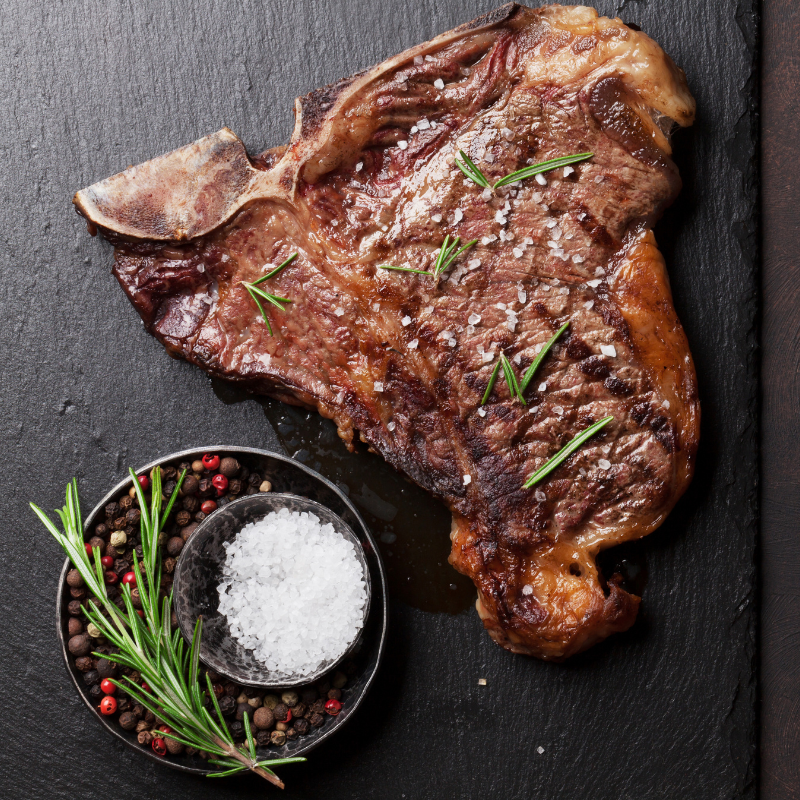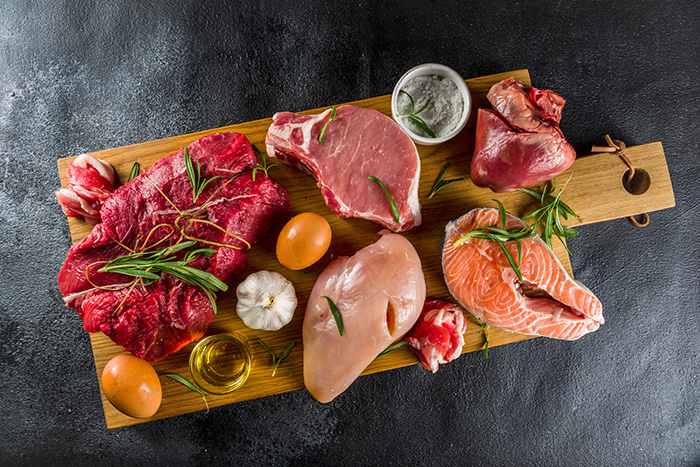What is Carnivore You Ask?
The definition of a carnivore is an organism, typically an animal, that mostly eats meat. The Carnivore diet is an elimination diet that includes only animal sourced ingredients seasoned with salt such as beef, poultry, pork, lamb, organ meats, eggs and seafood. Oftentimes, butter, heavy cream and a few cheeses are eaten as well. It is rooted in the premise that our ancestors would eat meat primarily and defer to fruit or plants only when meat wasn’t available.
What Foods are on the Carnivore Diet?
On carnivore, animal based foods are what your plate will be filled with! It is about as uncomplicated as it can be. Meat, seafood, poultry, eggs, organs, and bone broth are the mainstays. Small amounts of dairy products are allowed if they are well-tolerated. Same goes for spices, with salt being encouraged.
What Foods are NOT on the Carnivore Diet?
On the flip side, the foods to avoid on carnivore are plant-based foods like fruits, vegetables, beans, nuts, seed oils, breads, grains, highly processed carbohydrates, and sugar.. Oh and obviously, no alternative meats.
What Drinks are Okay on Carnivore?
Water, coffee and tea without sugar, as well as electrolyte beverages are included on a Carnivore diet. Alcohol is typically excluded, but that is an individual decision.
How Many Carbohydrates are on a Carnivore Diet?
Typically none, which is why it is also referred to as the zero carb diet.

When Can I Eat on Carnivore?
The Carnivore diet is very freeing in the sense that you are encouraged to eat when you are hungry and stop when you are full. There are no certain times to eat or amounts to eat.
What are the rules of a Carnivore Diet?
The goal is to eat only meat and the highest quality meat that your budget can handle. That can range from ground beef and chuck roast all the way up to grass-fed beef and wild-caught salmon. The other rule is to learn true hunger cues, as opposed to stress or boredom moments. Learning when your body needs fuel may significantly reduce cravings!
Does a Carnivore diet give all nutrients needed to sustain life, in other words, is it safe?
Humans have been eating this way for as long as we know and only in the recent past has food been available in packages and boxes with preservatives, so common sense says that Carnivore is safe. Monitoring nutrients can absolutely be done for peace of mind. Adding in sardines or calf liver once a week will cover any “missing” vitamins. Of course everyone would love a high participant long-term clinical trial, so if someone out there wants to get that going, it would be great! Till then, personal testimony will fill the gap.
Why is the Carnivore Diet Good?
As with all elimination diets, the Carnivore diet removes everything that could cause inflammation or allergic reactions. It provides lots of life supporting protein and by eliminating all the extra foods, gives your body time to burn stored fat, promoting weight loss. It is an option for people looking to heal their body of chronic illnesses or reduce the number of medications they currently take. Eating healthy fats and protein means you will stay full longer, in addition to regulating hormones and be a way to naturally increase testosterone. Other outcomes reported include mental clarity, clearer skin, and better sleep.
What are the Side Effects of a Carnivore Diet?
The one difficult con to the carnivore plan is the withdrawal from foods you may be addicted to. If you are new to low-carb way of eating, a slow transition from keto to ketovore to carnivore may be a good approach to take to avoid the keto flu. Symptoms of keto flu include fatigue, headache, poor mood, aches or rashes. Additionally, there is no fiber so your digestive system will need some time to adjust and produce the correct amount of bile and digestive enzymes, but not to worry, it will. The pros to carnivore are improvement in body composition and resolution of medial symptoms or diagnosis that may be interfering in everyday life.
Are there Health Risks with a Carnivore Diet?
Most meat is high in saturated fat which has been seen in a negative light since the release of the Food Pyramid. However, there are many doctors, even cardiologists now citing research and clinical trials showing that saturated fat is not the cause of cardiovascular disease. Carnivores also use a lot of sodium when seasoning their meat which again, goes against common medical advice. In some people it can exacerbate gout. Regular blood work will help keep tabs on personal data such as A1C and cholesterol levels to adjust accordingly as needed. If you are taking medications it is important to discuss any diet change with your medical professional.
What is the Controversy with Carnivore?
Some will say that cost is prohibitive, but as mentioned earlier, expensive cuts of meat are not required. There is a lot of talk about meat being bad for the environment so that needs to be researched to see if that statement holds true. It has long been taught that meat is bad for the liver, kidneys or heart with saturated fat being to blame, but new data is emerging that may say the opposite. Certainly in social situations, planning may be needed to be sure you have the food options you need and kind answers for those questioning your dietary choices.. Carnivore can be viewed as restrictive but it can also be viewed as freeing, depending on your point-of-view.
What is a Sample Carnivore Meal Plan?
Breakfast ideas include:
Salmon and sausage patty
Omelet and steak bites
Eggs and bacon
Lunch ideas include:
Chicken drumsticks and wings
Hamburgers topped with fried eggs
Pork tenderloin
Dinner ideas include:
Shrimp with butter and ground beef
Ribeye steak
Beef roast
No need to stress with carnivore! It is simple and straightforward. Meat, salt and water. It may just be the back to basics re-start you’ve been looking for.


0 Comments